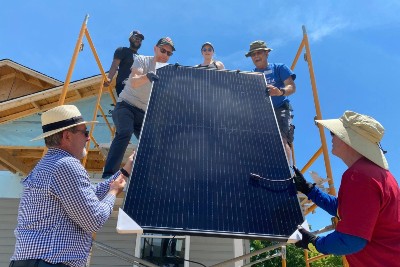
Every newly built Habitat for Humanity home in Harrisonburg and Rockingham County will have solar panels installed through 2026.
The Solar Seed Fund campaign that launched in February has exceeded the goal of $100,000.
GiveSolar, a Harrisonburg-based program of New Community Project, announces the successful completion of a Solar Seed Fund campaign for the benefit of Central Valley Habitat for Humanity homeowners.
GiveSolar has raised $127K for the local Habitat affiliate to allow the affiliate to install solar electric energy systems on all new houses that they build in the next five years.
The Solar Seed Fund is designed to be self-sustaining. Each family who receives a solar system will repay the upfront cost of the system into the Solar Seed Fund over the term of their mortgage. The regenerating fund will allow future Habitat homeowners to access the fund. The homeowners pay $20 per month for their solar energy systems.
GiveSolar has:
partnered with local solar installer, Green Hill Solar, to design and install the systems.
installed four solar systems on Habitat homes in Broadway and Harrisonburg.
built community spirit through organizing “solar barnraisings” which are volunteer supported solar installations.
Solar systems:
include 12 solar panels.
produce an average of 500 kW hours of electricity each month, saving Habitat homeowners an average of $60 each month on their electricity bill.
allow families to pay 4 cents per kilowatt hour for the electricity produced by their solar systems ($20 per month for 500 kW hours of electricity).
Homeowners will experience additional savings as the retail price of electricity climbs 3.6 percent each year for the next 10 years as requested by Dominion Energy. Solar systems will allow Habitat homeowners to lock in their low rates for the next 25 to 30 years, the typical lifespan of a solar system. In addition, solar homeowners can choose to sell their Solar Renewable Energy Credits which could put up to another $20 per month back in their pockets.
Solar homeowner, Amber Cox, of Broadway, shares: “I’ve always been open to solar and think it’s great for the environment. It’s a great way to get energy and reduce your electric bill.”
The Solar Seed Fund was supported by a broad spectrum of local and statewide contributors. Individual donors, faith communities, businesses, family endowments, and other advocacy non-profits combined forces to exceed the $100k goal in less than seven months.
Solar United Neighbors of Virginia collaborated with GiveSolar to tap into their statewide network of solar supporters to raise $30,000 for the seed fund.
“Solar United Neighbors was happy to support a project resulting in so many benefits for the local community,” said Aaron Sutch, Mid Atlantic Regional Director of S.U.N.
Dr. Doug Hendren, a frequent solar barnraising volunteer, states: “I have been involved as a volunteer with this project from the beginning. GiveSolar has firmly established that solar energy is for everyone, regardless of income.”
Now that the Solar Seed Fund Campaign is complete, GiveSolar will be partnering with Habitat for Humanity Virginia (the statewide office of Habitat) and Solar United Neighbors to implement solar programs within interested Habitat affiliates around the state. GiveSolar is developing a “Solar Access Toolbox” that will provide resources to Habitat affiliates to implement sustainable solar programs.
The tools in the toolbox will allow affiliates to install solar on the homes that they build going forward.
GiveSolar will carry out a two-year project that aims to develop the Solar Access Toolbox, install 10 pilot solar systems on Habitat homes within 10 unique Habitat affiliates in the state, and create an online platform that will advance the implementation of solar on low-income homes nationally. For those interested in financially supporting this project, donate here.
“Our pilot project with Central Valley Habitat for Humanity has effectively proven that installing solar on the homes of low-income households is a compelling model for addressing clean energy access, economic security, and climate change solutions,” said Jeff Heie, Director of GiveSolar.










